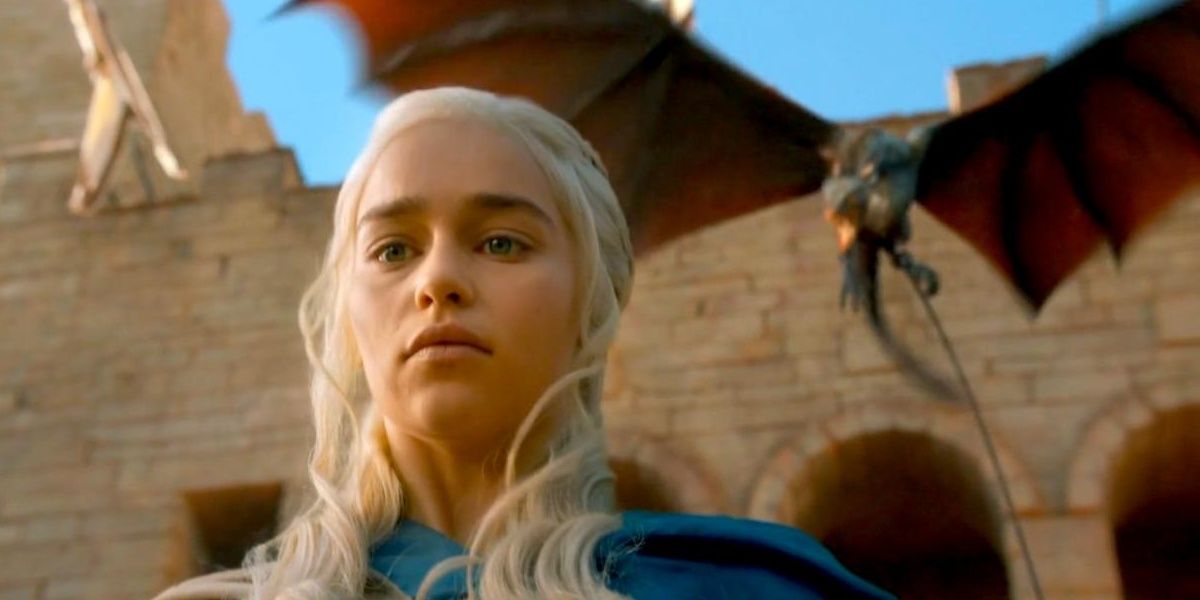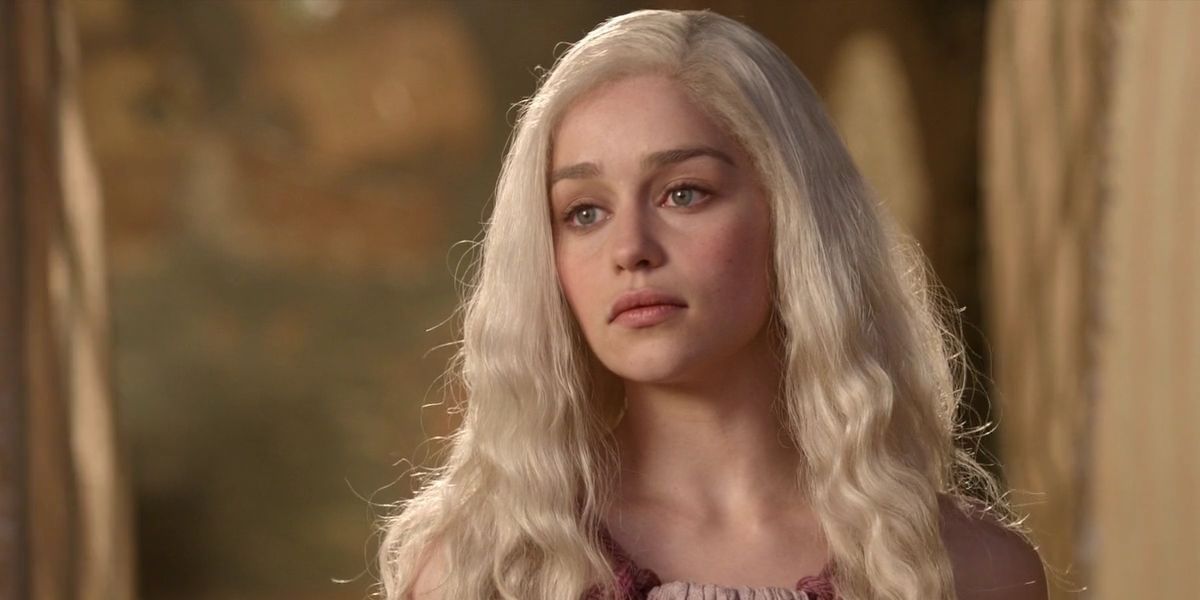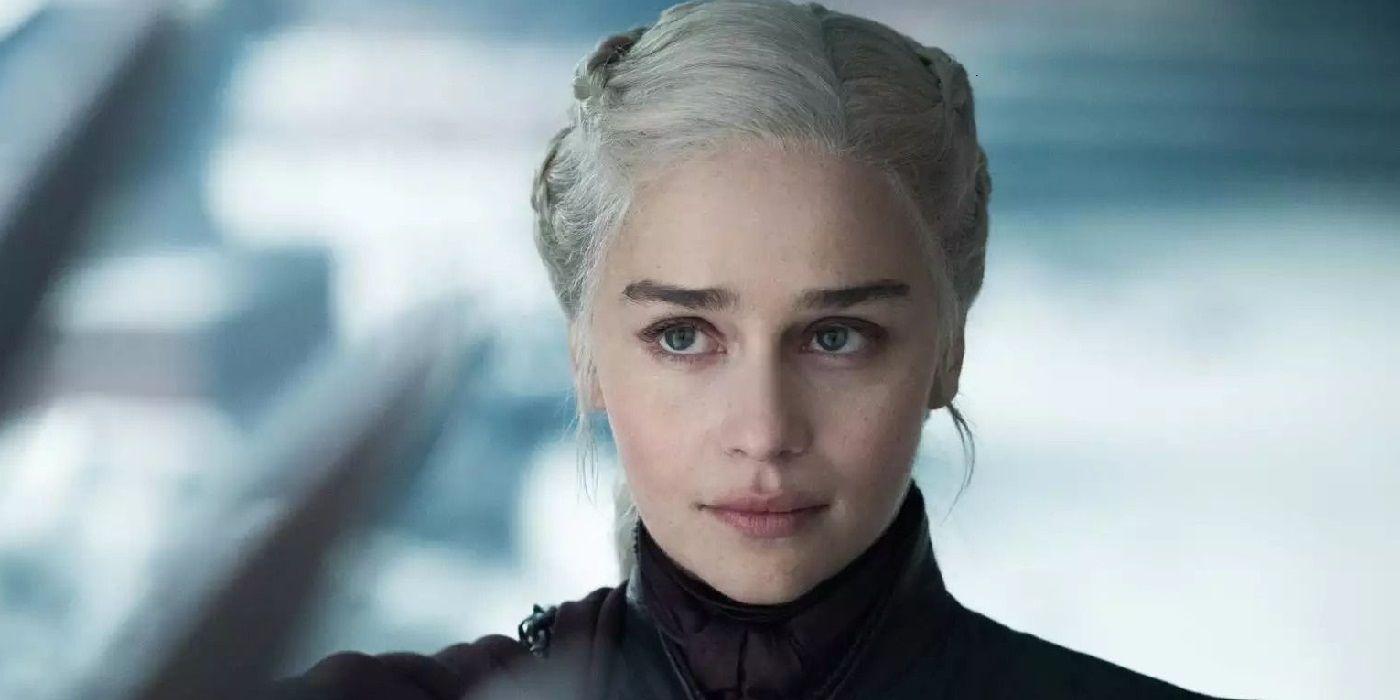
Destined as Mad Queen or not, Daenerys’ story arc stripped away her dignity.
Game of Thrones‘ iconic dragon-wielding Khaleesi, Daenerys Targaryen, who was skillfully played by Emilia Clarke, was given a character arc which justifiably angered many long-serving fans. Clarke, who has recently been starring in Marvel’s Secret Invasion, played the role with dignity and emotional weight. However, the show’s writing did her beloved character a great disservice; after many seasons of putting her character through countless traumatizing events, audiences hoped to be rewarded with a satisfying, respectful pay-off. However, the final result was rushed and crass, and did not give Daenerys the end that she deserved, portraying her as the Mad Queen that she had spent seven seasons trying to prove she wasn’t.
Daenerys Had The Potential For Greatness
Throughout the majority of Game of Thrones, Daenerys acts according to her own strong sense of right and wrong, even if the punishment seems brutal. Using the fiery might of her dragons, she calls “dracarys” to free herself from abusive situations and even liberate a whole population of slaves in her plight for justice. Throughout the series, her intentions to “break the wheel” and create a just society in which everyone can live safely are clear, and she works towards her goal whilst proving her political prowess, gradually gaining more followers who will loyally support her aims. It seems that a rightful heir and fair ruler would finally be taking the Iron Throne, saving it from the cold-hearted and selfish Cersei (Lena Headey). It would have been satisfying to see a Targaryen’s return to the throne, and having a dragon by her side would have made it all the more epic, making her demise all the more disappointing.
‘Game of Thrones’ Used Daenerys’ Trauma Against Her
To say that Daenerys’ descent into the Mad Queen is completely unprecedented would be an oversimplification, but it is clear that the path that the Khaleesi is forced to take has undertones of misogyny. Game of Thrones‘ portrayal and simulation of sexual encounters has been highly controversial, with Daenerys’ nudity and sex scenes being notably problematic on a number of levels. In the first season, in which Clarke was in her early 20s, she was faced with filming nude scenes which she stated on the “Armchair Expert” podcast was “terrifying.” Also having to depict scenes of sexual assault without the guidance of an intimacy coordinator, the situation often left Clarke in tears, and according to the podcast, feeling unworthy of voicing her needs.
As recklessly as Clarke herself was treated during this filming, Daenerys’ character was portrayed harmfully via an irresponsible narrative. Rather than handling the character’s numerous experiences of abuse — both realized and threatened — in a thoughtful, sensitive manner, these traumas were often just used as a crass tool with which to force her to wield her dragon might and rise from the ashes. The scene in which she is sexually abused by Khal Drogo (Jason Momoa) in particular does not leave room for Daenerys to heal or process it afterward; instead, she is compelled to use her sexuality to please him, which is wrongly portrayed in a positive light. The fact that the whole series concludes with her burning down King’s Landing could be read in the same light as a problematic sexual assault revenge movie, whereby the assault survivor’s main motivation and personality are reduced to enacting revenge. After years of mistreatment, Daenerys unleashes all of her pent-up rage and burgeoning madness disproportionately and indiscriminately, reduced to a flattened stereotype.
Daenerys Had to Continuously Defy Generational Trauma
Daenerys also lives under the weight of generational trauma. As shown in the prequel series House of the Dragon, her ancestral royal family was riddled with incest, infighting, and general dysfunction. Throughout the series, she tries to prove others wrong about the damning madness prophecy by uplifting the downtrodden and removing those who are threats to justice. Whilst she makes great strides in her fight for a just world, her advisors in the eighth season start to paint her as a tyrant. Throughout the series, she has had to fight against her family’s legacy and prove people otherwise — only to ultimately realize their prejudices.
Her Punishments Were Always Fiery, But A Far Cry From This
Daenerys’ final fiery showdown in the series’ penultimate episode “The Bells,” whereby she burns down innocent victims in King’s Landing after the city has surrendered, shows an extreme character regression into madness and cruelty. Yes, it has loosely been foreshadowed; but no, not to happen on this scale, with this little amount of build-up beforehand. By this point, those she loved the most including Missandei (Nathalie Emmanuel) and Jorah (Iain Glen) have been killed, and she has been forsaken by those she needed the most, including her lover Jon Snow (Kit Harington), and has been greeted by many with hostility, including Sansa Stark (Sophie Turner). Ending the series isolated, grieving, and alone was already a huge humiliation for a great character. However, the series culminating in Daenerys’ act of savagery also undermines everything she was working towards. There was no nuance, and not enough time allowed within the eighth season to justify these actions.
Daenerys’ turning point could arguably have been when she killed Samwell’s (John Bradley) father and brother for refusing to bend the knee to her, in an unusual move to secure power rather than justice, as is her normal moral priority. If more moments like this had been peppered throughout the final season, or perhaps introduced earlier, her last evil act may have been more fully earned. Although she similarly left Doreah (Roxanne McKee) and Xaro Xan Daxos (Nonso Anozie) to a particularly chilling fate in the second season, when her handmaiden’s betrayal prompted her decision to lock them inside a vault to starve to death, it was presented as a harsh penalty to do with loyalty, not power, and therefore remained in character.
Overall, it is clear that Dany’s treatment throughout Game of Thrones from the prejudice that emanated from her generational trauma to the poorly-depicted violence from Khal Drogo, was as brutal as her destructive ending.



.jpeg)